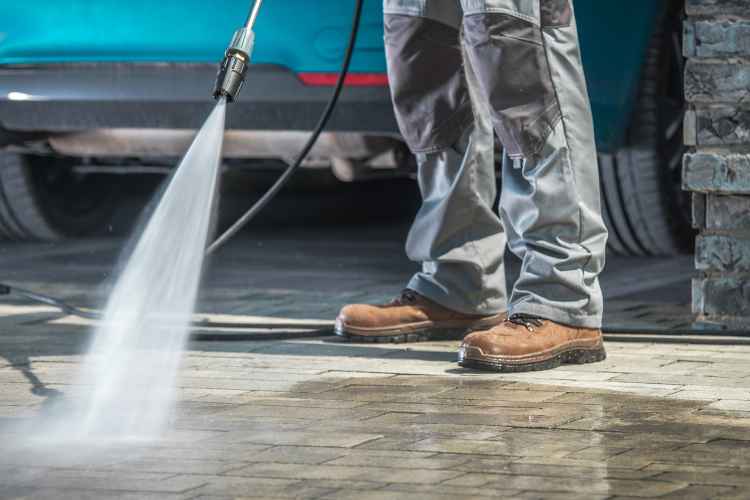Your driveway is one of the first things people notice about your home. Whether you’re looking to boost curb appeal, prevent long-term damage, or simply maintain a clean outdoor space, keeping your driveway in top shape is essential. But before you grab a high-pressure cleaner and start blasting away, there are a few key considerations that EcoJetPro Surface Restoration Services suggest you keep in mind. In Brisbane’s climate, factors like surface material, stains, and water runoff play a big role in how you should approach cleaning your driveway. Here’s what you need to know.
Surface Material Matters
Driveways aren’t one-size-fits-all, and the way you clean yours depends on the material it’s made from. Using the wrong cleaning method can lead to damage, so it’s important to understand what works best for each type.
- Concrete Driveways – Durable and common in Brisbane, concrete can handle high-pressure washing. However, using too much pressure or harsh chemicals can cause etching or discolouration.
- Asphalt Driveways – Softer than concrete, asphalt requires a gentler approach. High-pressure washing can break it apart, so soft washing techniques with eco-friendly detergents are ideal.
- Paver or Brick Driveways – These driveways look great but need extra care. High-pressure cleaning can loosen the sand between the pavers, leading to shifting and uneven surfaces. Sealing them after cleaning helps maintain their structure.
- Exposed Aggregate – While tough, exposed aggregate surfaces can be sensitive to strong pressure. A combination of soft washing and a mild detergent is the safest bet.
Stains: Identifying and Removing Them
Brisbane’s warm, humid climate makes driveways a hotspot for mould, algae, and other unsightly stains. Different stains require different treatments, so it’s important to identify the problem before tackling it. For driveway cleaning Brisbane residents turn to for expert stain identification and removal, visit our website for more information.
- Oil and Grease Stains – These are some of the toughest stains to remove. Degreasers and specialised detergents help break down oil, but in some cases, a professional clean is the best option.
- Mould and Algae Growth – With Brisbane’s humidity, mould and algae love to grow on driveways. Using an eco-friendly anti-microbial treatment can help prevent regrowth after cleaning.
- Rust Stains – Often caused by outdoor furniture, irrigation systems, or metal fixtures, rust stains need specialised rust removers that won’t damage the surface.
- Tyre Marks – These black streaks can be tough to remove, but high-pressure washing combined with a degreasing solution usually does the trick.
Water Runoff and Environmental Impact
One of the biggest mistakes homeowners make when cleaning their driveway is not considering where all that water (and the chemicals in it) will go. Brisbane has strict stormwater regulations, so being mindful of water runoff is crucial.
- Stormwater Pollution – Harsh chemicals and dirty water can easily enter storm drains, polluting local waterways. That’s why we offer driveway cleaning Brisbane locals utilise for an eco-friendly clean, ensuring a spotless finish without harming the environment.
- Water Usage – With Brisbane’s water restrictions in mind, it’s best to use efficient cleaning methods that don’t waste excessive amounts of water. High-pressure cleaning, when done properly, can be water-efficient.
- Surrounding Gardens and Lawns – If you’re using cleaning solutions, ensure they won’t harm your plants or leach into the soil. Eco-friendly, biodegradable products are the safest choice.
Key Features of a Professional Driveway Clean
- Surface-Specific Cleaning – Experts adjust their methods depending on your driveway’s material, preventing damage.
- Stain Removal – Professional treatments target stubborn stains like oil, rust, and tyre marks.
- Eco-Friendly Solutions – Eco-friendly solutions – Many professional services, including EcoJetPro Exterior Maintenance Services, prioritise environmentally responsible cleaning methods to reduce their impact on the surroundings while delivering outstanding results.
- Water-Efficient Techniques – High-pressure cleaning is done efficiently to reduce water wastage.
- Preventative Treatments – Sealing and protective coatings can help extend the lifespan of your driveway.
FAQs About Cleaning Your Driveway
How often should I clean my driveway? In Brisbane’s climate, a professional clean every 6 to 12 months is ideal to prevent mould and dirt buildup. However, spot cleaning for stains should be done as soon as possible.
Can I use bleach to remove stains? While bleach can help with some stains, it’s not the best option for driveways. It can discolour surfaces and harm surrounding plants. Eco-friendly alternatives are a safer choice.
Will high-pressure cleaning damage my driveway? Not if done correctly. The pressure needs to be adjusted based on the surface material. Pavers and asphalt require lower pressure, while concrete can handle higher pressure.
What’s the best way to prevent mould from coming back? Applying an anti-microbial treatment after cleaning helps prevent regrowth. Ensuring good drainage and regular maintenance also reduces the chances of mould returning.
Should I seal my driveway after cleaning? Yes, sealing helps protect against stains, wear and tear, and environmental damage. It’s especially beneficial for pavers and exposed aggregate driveways.
Keeping your driveway clean not only improves your home’s appearance but also extends its lifespan and prevents costly repairs. Whether you choose to DIY or hire a professional, understanding these key considerations will help you make the best choice for your Brisbane home. Schedule your quote today and see the difference!



